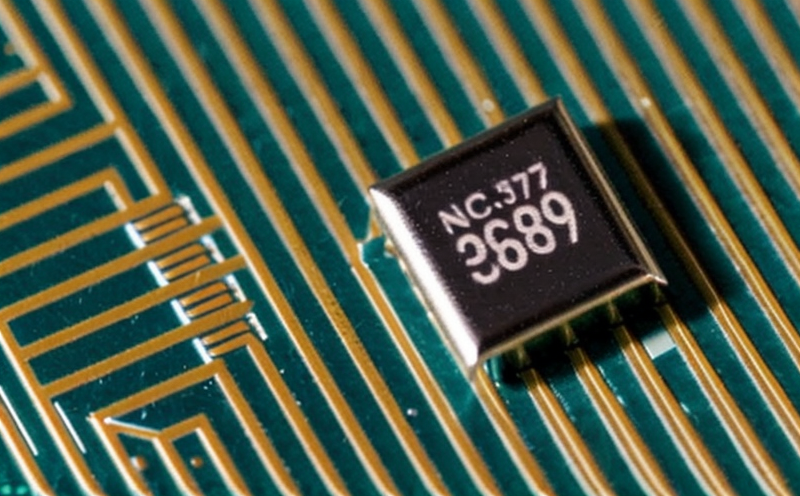JEDEC JESD22-A108 High Temperature Operating Life Testing
The JEDEC JESD22-A108 standard is a critical component in the evaluation of semiconductor and microchip reliability. This test is designed to simulate real-world conditions where devices are subjected to high operating temperatures for extended durations. The objective is to identify potential failure modes, endurance limits, and the overall durability of the microchips under these harsh conditions.
The JESD22-A108 standard is particularly relevant in industries such as automotive, aerospace, and military electronics where devices must operate reliably in extreme temperature environments. By subjecting the microchips to high temperatures for an extended period, this test helps manufacturers ensure that their products meet stringent quality and reliability standards.
The testing process involves placing the microchip specimens into a controlled environment where they are exposed to temperatures up to 150°C (302°F) or higher. The specimens are then subjected to continuous operation for extended durations, typically ranging from several hundred hours to thousands of hours depending on the specific test requirements and the desired level of reliability.
The JESD22-A108 standard specifies not only the temperature conditions but also the methods for specimen preparation, testing procedures, and acceptance criteria. Specimen preparation involves ensuring that the microchips are in a state similar to their intended operating environment, which may include pre-conditioning processes such as burn-in or conditioning at lower temperatures.
The testing apparatus used for JESD22-A108 is designed to maintain precise temperature control and monitor the performance of the specimens under test. The apparatus typically includes a chamber capable of maintaining high temperatures with minimal fluctuation, along with monitoring systems that can track various parameters such as voltage, current, power dissipation, and operating frequency.
The acceptance criteria for JESD22-A108 are stringent and ensure that only microchips meeting the specified performance standards pass the test. These criteria include the ability of the microchip to operate without failure or degradation within the defined temperature range and duration. The results of the testing are used by quality managers, compliance officers, R&D engineers, and procurement teams to make informed decisions about product design, manufacturing processes, and material selection.
Real-world applications of JESD22-A108 include the automotive industry where microchips must operate reliably in engine control units that can face extreme temperatures during operation. In aerospace electronics, ensuring the reliability of avionics components is critical for mission success. For military electronics, the ability to maintain performance under harsh environmental conditions is paramount.
Understanding the parameters involved in JESD22-A108 testing helps stakeholders appreciate the importance of this standard in the semiconductor and microchip industry. By adhering to these standards, manufacturers can produce products that meet high reliability requirements, ensuring safe and effective operation in critical applications.
| Applied Standards | Description |
|---|---|
| JESD22-A108 | JEDEC standard for High Temperature Operating Life Testing of semiconductors and microchips. |
| ISO 9360-1 | International standard for thermal cycling tests on electronic components. |
Applied Standards
- JESD22-A108: This standard specifies the procedures and conditions for high temperature operating life testing of semiconductors and microchips.
- ISO 9360-1: While not directly related to JESD22-A108, this international standard provides additional context on thermal cycling tests which can complement the high temperature testing requirements.
Quality and Reliability Assurance
- The primary focus of JESD22-A108 is to ensure that microchips can operate reliably under extreme temperatures for extended periods. This ensures that the products meet stringent reliability standards.
- The testing process involves continuous operation of the specimens at high temperatures, monitoring their performance, and recording any failures or degradation in performance.
Through rigorous quality assurance processes, stakeholders can have confidence in the results obtained from JESD22-A108 testing. Compliance with this standard ensures that products are robust and reliable, meeting industry benchmarks for quality and reliability.
Customer Impact and Satisfaction
- The test directly impacts customer satisfaction by ensuring that microchips perform reliably in real-world conditions.
- By identifying potential failure modes early in the development process, customers can benefit from improved product performance and extended lifespan.
Customers, including quality managers, compliance officers, R&D engineers, and procurement teams, rely on JESD22-A108 testing to make informed decisions about product design and manufacturing processes. This ensures that the final products meet high reliability standards, leading to increased customer satisfaction and loyalty.





